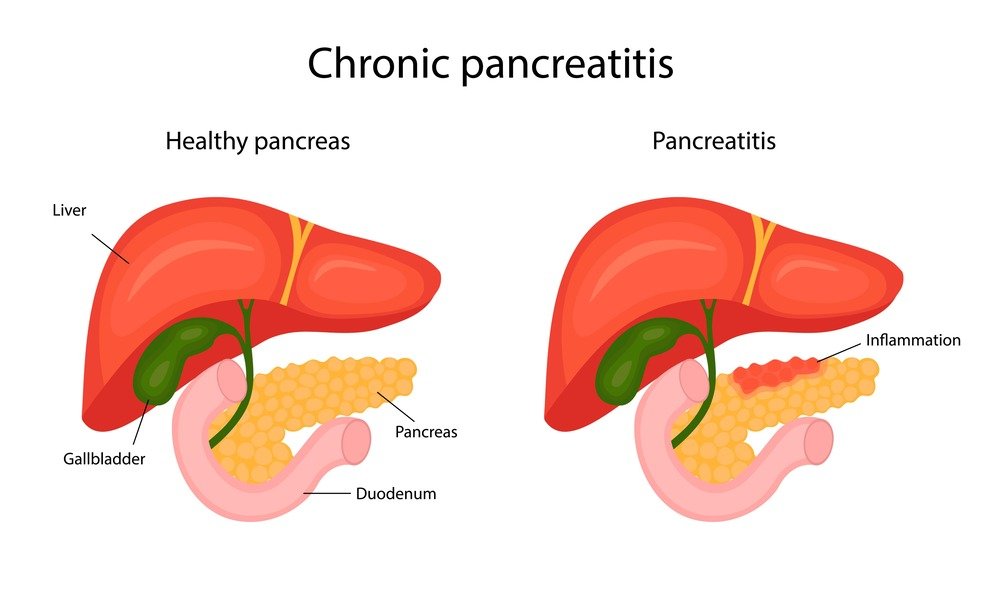Pancreatitis is a medical condition characterized by inflammation of the pancreas, an organ located in the abdomen that plays a crucial role in the digestive process. The pancreas produces enzymes and hormones that help break down food and regulate blood sugar levels. When the pancreas becomes inflamed, its ability to function properly is compromised, leading to a range of symptoms and potential complications.

In this article, we will explore everything you need to know about pancreatitis, including its causes, symptoms, diagnosis, treatment, and prevention.
Causes of Pancreatitis
There are several possible causes of pancreatitis, including:
- Gallstones: Gallstones are a common cause of pancreatitis, especially in people over 50 years of age. When a gallstone blocks the common bile duct, which carries digestive enzymes from the pancreas to the small intestine, it can cause the enzymes to back up and inflame the pancreas.
- Alcohol consumption: Heavy alcohol consumption over a prolonged period can also cause pancreatitis. Alcohol can damage the pancreas and lead to inflammation and scarring.
- Trauma: Trauma to the abdomen, such as a car accident or a severe blow to the stomach, can cause pancreatitis.
- Infections: Certain infections, such as mumps, can cause pancreatitis.
- Medications: Certain medications, such as steroids and some antibiotics, can cause pancreatitis.
- Genetics: Some people may be genetically predisposed to pancreatitis.
Symptoms of Pancreatitis
The symptoms of pancreatitis can vary depending on the severity of the inflammation. Some of the most common symptoms include:
- Abdominal pain: The pain is usually located in the upper abdomen and may be severe and constant or intermittent.
- Nausea and vomiting: Pancreatitis can cause nausea and vomiting, especially after eating.
- Fever: A fever may develop in response to the inflammation.
- Rapid heartbeat: The heart rate may increase as the body tries to compensate for the inflammation.
- Jaundice: If the inflammation is severe, it can cause a yellowing of the skin and eyes.
- Weight loss: The inflammation can interfere with the body’s ability to digest food, leading to weight loss.
Diagnosis of Pancreatitis
If a person experiences symptoms of pancreatitis, their doctor will likely perform a physical exam and order diagnostic tests to confirm the diagnosis. Some of the most common tests include:
- Blood tests: Blood tests can measure levels of enzymes produced by the pancreas, such as amylase and lipase. Elevated levels of these enzymes can indicate pancreatitis.
- Imaging tests: Imaging tests, such as ultrasound, CT scan, or MRI, can provide detailed images of the pancreas and surrounding organs, allowing doctors to identify inflammation or damage.
- Endoscopic ultrasound: This test involves passing a small ultrasound probe through the mouth and into the stomach to obtain images of the pancreas and surrounding structures.
- Biopsy: In rare cases, a small sample of pancreatic tissue may be taken for analysis.
Treatment of Pancreatitis
The treatment of pancreatitis will depend on the severity of the inflammation and the underlying cause. In mild cases, the inflammation may resolve on its own with rest and hydration. In more severe cases, hospitalization may be necessary. Some of the most common treatments for pancreatitis include:
- Pain management: Pain medications, such as acetaminophen or ibuprofen, may be prescribed to manage the abdominal pain.
- Intravenous fluids: Intravenous fluids may be administered to prevent dehydration and maintain electrolyte balance.
- Nutritional support: In severe cases, nutritional support may be necessary, such as intravenous feeding or a feeding tube.
- Treatment of underlying cause: If the pancreatitis is caused by gallstones, surgery may be necessary to remove the stones and prevent future blockages. If alcohol consumption is the cause, the person may need to stop drinking alcohol altogether to prevent future episodes.
- Medications: Certain medications may be prescribed to help manage symptoms and reduce inflammation. In some cases, antibiotics may be necessary to treat underlying infections.
Complications of Pancreatitis
If left untreated, pancreatitis can lead to a range of complications, including:
- Pancreatic pseudocysts: These are fluid-filled sacs that develop in the pancreas as a result of inflammation. They can cause abdominal pain and may need to be drained surgically.
- Infection: In severe cases, the inflammation can lead to infection in the pancreas or surrounding tissues, which can be life-threatening.
- Diabetes: If the inflammation damages the cells that produce insulin in the pancreas, it can lead to diabetes.
- Malnutrition: Chronic inflammation can interfere with the body’s ability to absorb nutrients, leading to malnutrition.
Prevention of Pancreatitis
There are several steps a person can take to reduce their risk of developing pancreatitis, including:
- Limiting alcohol consumption: Heavy alcohol consumption is a major risk factor for pancreatitis, so limiting alcohol intake is important.
- Eating a healthy diet: Eating a balanced diet that is low in fat and high in fiber can help reduce the risk of pancreatitis.
- Managing underlying conditions: Managing underlying conditions, such as gallstones or infections, can help prevent pancreatitis.
- Quitting smoking: Smoking is a risk factor for pancreatitis, so quitting smoking can help reduce the risk.
Conclusion
Pancreatitis is a serious medical condition that can cause a range of symptoms and potential complications. If you experience symptoms of pancreatitis, it is important to seek medical attention promptly. With proper diagnosis and treatment, many people with pancreatitis are able to recover fully and prevent future episodes. By taking steps to reduce your risk of developing pancreatitis, such as limiting alcohol consumption and eating a healthy diet, you can help protect your pancreas and maintain your overall health.
Find online help in writing essays, research papers, term papers, reports, movie reviews, annotated bibliographies, speeches/presentations, projects, presentations, dissertation services, theses, research proposals, essay editing, proofreading, Book reviews, article reviews, formatting, personal statements, admission essays, scholarship essays, application papers, among others.


 WRITE MY ESSAY NOW!
WRITE MY ESSAY NOW!